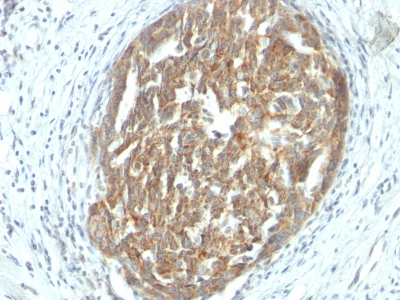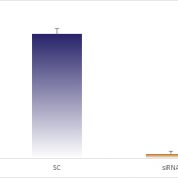Human, Mouse, Rat, Rabbit, and Canine Anti-VEGF Antibody Product Attributes
Species: Human, Mouse, Rat, Rabbit, and Canine
Tested Applications: Immunofluorescence, Immunohistochemistry (IHC).
Application Notes: Immunofluorescence (1-2ug of antibody/ml), Immunohistochemistry (IHC) (Formalin-fixed) (2-4ug of antibody/ml for 30 minutes at RT)
Clonality: Monoclonal
Anti-VEGF Antibody Clone: SPM225
Clone SPM225 Host and Isotype: Mouse IgG1 kappa
Anti-Human, Mouse, Rat, Rabbit, and Canine VEGF Positive Control Sample: Tumor cells in astrocytomas, breast or ovarian carcinomas.
Cellular Localization of Antibody Cytoplasmic, Cell Surface, Extracellular (Secreted)
Buffer and Stabilizer: 10mM PBS with 0.05% BSA & 0.05% azide.
Antibody Concentration: 200ug/ml
Antibody Purification Method:Protein A/G Purified
Immunogen: Human VEGF189 recombinant protein
Storage Conditions: Store at 2 to 8° C (refrigerate). Stable for 24 months when properly stored.
VEGF Previously Observed Antibody Staining Patterns
Observed Antibody Staining Data By Tissue Type:
Variations in VEGF antibody staining intensity in immunohistochemistry on tissue sections are present across different anatomical locations. An intense signal was observed in respiratory epithelial cells in the bronchus, glandular cells in the colon, duodenum, endometrium and gallbladder, hepatocytes in liver, macrophages in lung, exocrine glandular cells in the pancreas, decidual cells in the placenta, trophoblastic cells in the placenta, glandular cells in the prostate, rectum, salivary gland, seminal vesicle and small intestine, chondrocytes in mesenchymal tissue, fibroblasts in mesenchymal tissue, glandular cells in the stomach, Leydig cells in the testis, glandular cells in the thyroid gland, squamous epithelial cells in the tonsil and urothelial cells in the urinary bladder. More moderate antibody staining intensity was present in respiratory epithelial cells in the bronchus, glandular cells in the colon, duodenum, endometrium and gallbladder, hepatocytes in liver, macrophages in lung, exocrine glandular cells in the pancreas, decidual cells in the placenta, trophoblastic cells in the placenta, glandular cells in the prostate, rectum, salivary gland, seminal vesicle and small intestine, chondrocytes in mesenchymal tissue, fibroblasts in mesenchymal tissue, glandular cells in the stomach, Leydig cells in the testis, glandular cells in the thyroid gland, squamous epithelial cells in the tonsil and urothelial cells in the urinary bladder. Low, but measureable presence of VEGF could be seen in cells in the molecular layer in cerebellum, endothelial cells in the cerebral cortex, neuropil in cerebral cortex, endothelial cells in the colon, smooth muscle cells in the smooth muscle, adipocytes in mesenchymal tissue, cells in the red pulp in spleen and cells in the white pulp in spleen. We were unable to detect VEGF in other tissues. Disease states, inflammation, and other physiological changes can have a substantial impact on antibody staining patterns. These measurements were all taken in tissues deemed normal or from patients without known disease.Observed Antibody Staining Data By Tissue Disease Status:
Tissues from cancer patients, for instance, have their own distinct pattern of VEGF expression as measured by anti-VEGF antibody immunohistochemical staining. The average level of expression by tumor is summarized in the table below. The variability row represents patient to patient variability in IHC staining.| Sample Type | breast cancer | carcinoid | cervical cancer | colorectal cancer | endometrial cancer | glioma | head and neck cancer | liver cancer | lung cancer | lymphoma | melanoma | ovarian cancer | pancreatic cancer | prostate cancer | renal cancer | skin cancer | stomach cancer | testicular cancer | thyroid cancer | urothelial cancer |
|---|---|---|---|---|---|---|---|---|---|---|---|---|---|---|---|---|---|---|---|---|
| Signal Intensity | ++ | ++ | ++ | +++ | +++ | ++ | ++ | +++ | +++ | + | ++ | ++ | ++ | +++ | ++ | +++ | ++ | - | ++ | ++ |
| VEGFA Variability | ++ | ++ | ++ | + | ++ | +++ | ++ | + | + | ++ | ++ | +++ | ++ | ++ | ++ | ++ | ++ | ++ | ++ | ++ |
Limitations and Warranty
enQuire Bio's VEGF Anti-Human Monoclonal is available for Research Use Only. This antibody is guaranteed to work for a period of two years when properly stored.

.jpg)



-178x178.jpg)


-178x178.jpg)
There are no reviews yet.